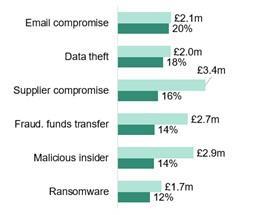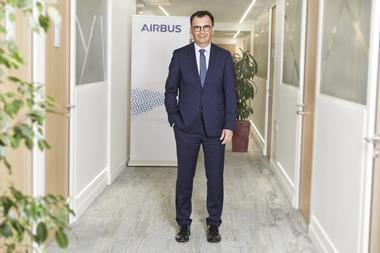The lure of the start-up may be great, but so are the risks. Adam Selwood and Susie Jones, the hearts and minds behind Cynch Security, took the gamble, emboldened and inspired by one thing – a great idea.
There are four reasons start-ups fail: neglect or fraud, lack of experience, a lack of managerial experience and general incompetence. Combine this with the fact that 50% of all start-ups fail in the first five years, and you might wonder why anyone would even try. It usually comes down to knowing you have a really good idea, and for Melbourne-based Cynch Security cofounders Susie Jones and Adam Selwood, both formally in cyber risk management roles with Australia Post, that idea was just too good not to take forward.
Another interesting fact about start-ups is that 70% of entrepreneurs come up with their idea while working for someone else, which is precisely where the Cynch seed was sown. Selwood begins the story: “About three years ago, I had started to learn about and get a little bit more exposure to the start-up world and start-up culture, which was around the same time Australia Post was running these things called ‘Hack Days’, an internal initiative. The concept was that you’d come up with an idea, spend 24 hours working on that idea and then compete against a bunch of other teams doing the same thing to see if you could come up with something that was viable and interesting to the business.”
He goes on: “Around the same time, I was away for Christmas break and was continuing to research startups and came across haveibeenpwned.com, which is a service that allows you to check if your email address has been hacked. I thought this would be a great idea to adapt for the Hack Day.” Selwood says that, while the idea was kicked around, Australia Post ultimately decided it wasn’t for them, meaning he didn’t become one of their “intrapreneurs”, as they are dubbed.
LET’S DO THIS
Fast forward a few months and Selwood was invited to move into Australia Post’s Accelerator Programme. “I was essentially given an opportunity to go o and see if we could create a commercial opportunity around an idea. I wanted to find a way to help small businesses when they discover that they’ve had a data breach.” “We were looking at that as an internal initiative and during that process, I met Susie. Susie was introduced to me by someone in that programme who basically said: ‘Hey, you should see if cyber insurance can play a part in this space. And if I know anything about cyber insurance, it’s that you should go talk to Susie because she knows absolutely everything about cyber insurance.’”
“That’s true,” Jones shrugs, laughing. “We met over co ee and I agreed to join Adam. We spent another six months toying around, working with a non-profit up in the Sunshine Coast called IDCare, who provide free counselling service for anyone who was hit by a data breach. But ultimately, we just helped Australia Post realise they didn’t want to be a cybersecurity company.” They were unfazed. Selwood says: “They closed down that initiative, unfortunately. By that point, both Susie and I had had first-hand experience with a number of different small businesses in that space. As a result of that, we just kind of caught the bug and felt the need to solve for that problem.” “That is kind of the catalyst for many businesses in these spaces. You find a problem that you fall in love with and you develop a passion for that problem and for solving it. Once you see that no one else is out there solving it, you can’t forget about it or leave it alone. We didn’t get the opportunity to continue with our idea at Australia Post, so we created Cynch Security to solve it instead.”
THROWING THE LADDER ASIDE
Jones is the more pragmatic of the duo; something that is clear from their respective routes into the notoriously difficult world of start-ups. “My path was a little bit different because Adam had discovered start-up land and was interested in that. That’s how he then created the opportunities within Post to go up and play in that space. For me, I had no intention of doing any of that. I was climbing the corporate ladder determinedly and I was doing everything I could to keep on going.”
“It just happened to be when I had that coffee with Adam that my secondment was coming to an end and I didn’t want to go back to being a risk manager. I just didn’t want to go back to my day job. Then he told me what he was doing, that he was getting paid to play a co-founder essentially, and I thought: ‘Okay, that’s totally a thing that I need to go o and do.’” In the end, it was the tantalising prospect of decamping from corporate bureaucracy that sold Jones to the idea of tackling Cynch full-time. “So much of being in a large corporate is just working within the machine. Even when you’re really amazing at your job, does it really actually impact somebody else’s life? After the project got shut down, we went back to our day jobs. I was living with a split personality because I spent nights and weekends working on Cynch with Adam but every other day in risk management and corporate bureaucracy.”
After 15 months of working on Cynch as a side project, Jones had had enough. “Some months we didn’t get to touch Cynch at all. Some months life got too busy and it was too hard. We’d come back two months later and then have to figure out where we were up to, which was incredibly frustrating. Eventually, I was getting a massage and I actually allowed myself to think about what life would be like if I was working on Cynch full-time. By the time I’d got o the massage table, I decided I would quit, and that was that.”
“I messaged Adam and said: ‘Hey, pretty sure I’m going to resign on Monday to work on Cynch. How do you feel about that?’ Then I went home and had a three-minute conversation with my husband, who said, ‘Sure.’ And off I went.”
ONTO A GREAT THING
The next step for this double act was gaining a place on the CyRise Accelerator (a cyber security venture accelerator program, powered by Dimension Data/NTT and Deakin University); something Selwood attributes wholly to Jones’s fearlessness in leaving her day job. “The programme that we were applying for at the time, we didn’t know if we’d been accepted but Susie said: ‘I’m going to go do this regardless.’ Ultimately, I think that was possibly the thing that got us into the programme – you actually just stating: ‘I’m doing this whether or not you’re involved, guys.’ And they said: ‘Okay, someone who’s got the balls to do that should really get involved in this.’”
Conversation easily flits between Selwood and Jones, sometimes to the point where you feel like a third wheel, but it is clear their natural rapport is one of the key reasons for the incredible success of the business. Cynch was one of just two international finalists in the NYCx Cybersecurity Moonshot Challenge. The event, run by the NYC Mayor’s Office of the Chief Technology Officer, was launched in late 2018 to tackle how to make every small and mid-sized business in New York City and beyond as resilient to cyber security attacks as the Fortune 500 companies. Despite ultimately not winning the challenge, the team are undoubtedly onto a good idea.
WHAT’S THE WORST THAT CAN HAPPEN?
With failure always looming on the doorstep of startups, it is of little surprise that Selwood and Jones have a laundry list of mistakes they’ve made along the way, lessons they are keen for other entrepreneurial risk managers to learn from. “Save money,” says Jones. “Save as much as you can before you make the leap, because it will give you more of a runway to take off from.”
“I also didn’t gain as much empirical evidence before I made the decision as I probably should have. Thankfully, it turned out all right in the end anyway. But what is going to be right for one person is not necessarily going to be right for somebody else, and you’ve just got to be flexible and make it work the best you can.” Selwood is quick to echo Jones’s thoughts on saving money and adds timing as a huge factor in the success or failure of start-ups.
“The reasons we took the jump to Cynch full-time were about timing and the external factors affecting each of us. In the 12 months prior to the CyRise programme, there was no pressure from any direction. In every instance, where we’ve made that call to do this full-time, there’s been some sort of external pressure – be it the market has matured or there are a lot of customers talking to us.”
In true risk manager style, Selwood ponders aloud whether he would have changed the timing on his leap to Cynch. “Ultimately, timing wise and when to do it – it’s not really an option to be honest. It was then. It was then or never, and so if the alternative was never, then I don’t regret it. You see something, you jump towards it. The other side of the calculation has always been if I don’t do this then I’m going to forever regret not having done this. I would have been really disappointed in myself if I hadn’t taken the leap.” Jones sees things a little differently.
Turning to Selwood, she remarks: “It’s funny that you say you think about regrets because I never do. I probably should sometimes but I never do. What was the worst that could happen? The worst case was that we couldn’t afford our rent for a while and had to move in with friends and I had to get another job. Once I’d settled that in my mind, then I allowed myself to go off and have the big audacious daydreams of: ‘How big could this get?’ And in my head it can get really, really, really big, so that makes it a much easier decision.”
IN THE SAME CORNER
Selwood is the natural dreamer of the two, having come from a family of entrepreneurial business owners, while Jones is evidently, unmistakably the mouthpiece of the business. This balance is nice but there will always be disagreements, even in the best partnerships. How are they solved at Cynch? “Cage fighting,” says Selwood, with a deadpan expression. “I would totally win,” retorts Jones.
Jokes aside, Jones says: “Both of us are really bad if we let anything bottle up. It’s also really obvious if we do, so there’s no point even trying to – we just talk it out.” Selwood adds that the focus of their combined mission helps keep them from all out war. “We have different ideas, which we present in different ways. Sometimes we deviate from each other but we always find our way back via our shared mission.”
Before our conversation can become too ‘smiles and rainbows’, Jones quickly points out one of the hardest facts about working as a partnership in a start-up. “You have to be really honest with yourself about your strengths and weaknesses and what do you need to be able to overcome these weaknesses. Because there’s no hiding when you’re building a start-up. If you’re bad at something, you get found out embarrassingly fast.” And when you are both bad at the same thing? “We go and have a beer together and find a way to suck it up,” laughs Selwood.
There is no stopping this whirlwind pair as they gear up for the next stage of Cynch – organic growth of their team and their footprint over the coming year. It’s something they are both understandably excited about. As for any talk of failure, that simply isn’t the plan.




















No comments yet